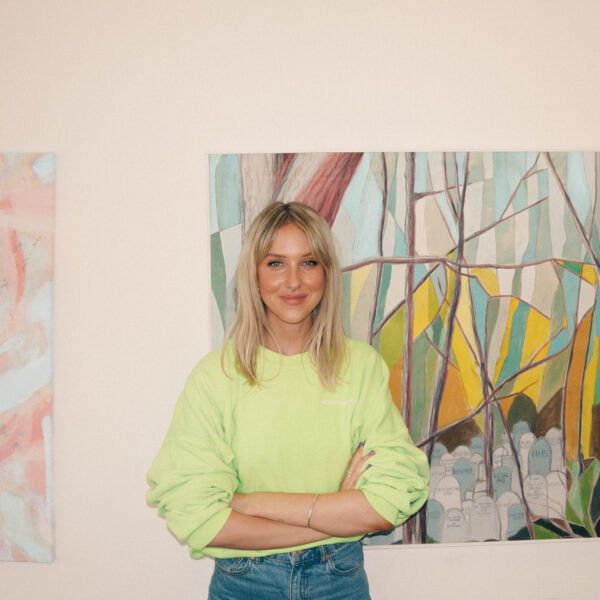
Natasha Collie
Senior Brand Marketing Manager at Penguin Random House UK
At the start of the year, Ladybird Books approached Sonder & Tell with a dream brief. In 2021, a year that’s been particularly challenging for...
In conversation with
Co-Founders of The Foreword

2020: the year that living rooms turned into offices and work culture turned into – well – that remains to be seen. Also the year that Arabella and Lilith, co-founders of The Foreword, saw an opportunity to launch a career-focused digital platform that centres people, not the brands or businesses they work for.
“We like to think of The Foreword as a platform that takes the power out of the hands of those who historically dictate what ‘success’ looks like, and puts it back in the hands of our audience.”
We spoke to Arabella and Lilith about the future of workplace culture, why we’re more comfortable with ‘self-work at work’ and how to create an engaged community.
This year especially, we recognised the power and weight a community platform can hold in informing people’s views. We asked ourselves, what would happen if there were no gatekeepers prescribing the direction of content, and instead, the subjects controlled the messaging? And voila! Our pandemic baby was born.
People are turning to celebrities, influencers, online platforms and public figures on social media for guidance; in a way, we wanted to see the “average” person reclaiming some of that power. Everyone has a story to tell and powerful, pertinent advice to give! There are so many voices that deserve to be heard, and our approach isn’t driven by the traditional, dated markers of “success”.
We saw career content as an afterthought for many traditional media outlets which often overlooked the emotional, personal and less conventionally ‘successful’ voices and their insights. We like to think of The Foreword as a platform that takes the power out of the hands of those who historically dictate what ‘success’ looks like, and puts it back in the hands of our audience.
Buzzy words and phrases (burnout, inner saboteur, girlboss and toxic positivity) have become such a part of our work ‘vernacular’ (we millennials love to label and identify) and are thrown around so often, but people need practical ways of managing or overcoming these feelings or issues. Self-work at work seems like a natural progression; it’s one thing to identify a problem but another entirely to find ways to set boundaries within a work context and find fulfilment.
We’ve observed that people are more interested in holistic approaches to self-development now, rather than compartmentalising the different aspects of their lives. The Foreword examines how our hobbies, personalities, mental health, and other facets of life often prioritised by millennials, intersect with career, and why a socially-conscious approach to finding success isn’t tied up in the individual but rather the community as a whole.
“Buzzy words and phrases (burnout, inner saboteur, girlboss and toxic positivity) have become such a part of our work ‘vernacular’ (we millennials love to label and identify) and are thrown around so often, but people need practical ways of managing or overcoming these feelings or issues.”
The line between our work and personal life is more blurred than ever, and for that to be sustainable, employers are going to have to recognise that flexibility is vital. After 2020, we hope career culture will move towards identifying the scope of needs that people require; productivity is not one size fits all! Whether these are physical needs or differences in working patterns, we hope that nuance is recognised.
It feels like grind culture is taking a much-needed step back, too. 2020 opened a lot of people’s eyes to the failings of the status quo and how important our health and wellbeing is. People should feel empowered to shout about their achievements, but not everyone needs a full-time-job and five side hustles to be fulfilled.
We’re noticing that people take their whole selves into work with them these days, as opposed to slipping into different personas. If brands recognise that people work best when their needs are met, and their strengths are acknowledged, it will help them in the long-run with productivity, retention and everything in between. Most people spend the bulk of their time working and communicating with colleagues, so if the workplace culture is off, it permeates everything.
Juno is such an exciting and much-needed concept. Restless and PepTalkHer both do a great job of providing actionable, positive content for women online, especially around work-related concerns. In terms of workplace wellbeing, that space feels super underrepresented and lacking. Hopefully, post-2020 that will change, and we can be involved in leading the charge!

Flex Mami (a.k.a. Lillian Ahenkan) for her wit and ability to get people thinking; Stefanie Sword-Williams of Fuck Being Humble for her practical and empowering advice; Izzy Obeng of Foundervine for her sharp business acumen; Elise Swopes for her ability to capitalise on her creativity in unique and innovative ways.
Thank you! We’ve been overwhelmed by how our community has grown in the past six months. Now more than ever, the negative aspects of social media can feel overwhelming. One of our aims is to remind people that social media can be a space where they are welcome and safe, rather than intimidated and scrutinised. Online communities should feel like a space to be open and heard, but also an opportunity to leave your echo chamber and break away from standardised thoughts and opinions.
We encourage our guests to nominate people that they follow on social media, people they admire or are inspired by. Rather than feeling jealousy over the achievements of the people we follow, we want to embolden people to create platforms and make space for others to share their success. We aim to foster cooperation and learning rather than comparison and competition. There’s room for different types of opinions, tones and voices online, but we think it’s our unapologetic positivity that has resonated so strongly with people!
We want to explore doing events, maybe a business conference with the four speakers we mentioned above is on the cards! What feels so special about The Foreword is that it could really develop or grow into anything. A podcast or IGTV series, even something more tangible like a journal or sticker set—anything is possible.

Senior Brand Marketing Manager at Penguin Random House UK
At the start of the year, Ladybird Books approached Sonder & Tell with a dream brief. In 2021, a year that’s been particularly challenging for...

Founder Of Simple Politics
Talking about serious issues doesn’t mean defaulting into a serious tone of voice, or using complicated language. If anything, accessibility, clarity and a touch of...

Brand & Community Manager at Homethings
Creating a tone of voice from scratch can be challenging. But a blank slate to work from also mean there’s room for something a bit...

Impact Strategist

Marketing Manager at noissue